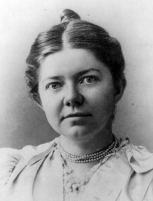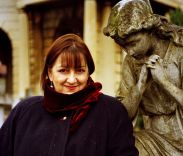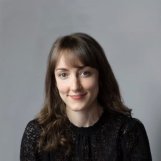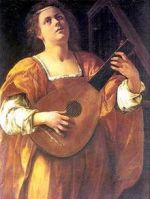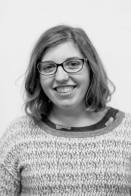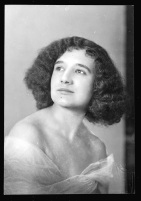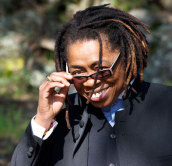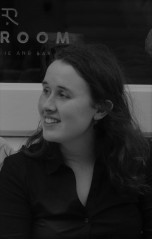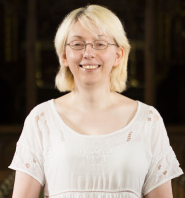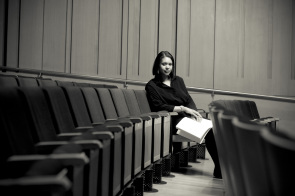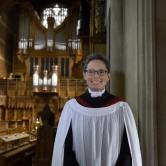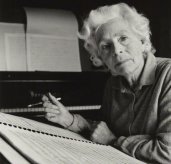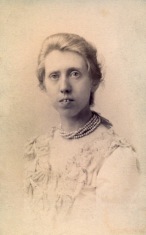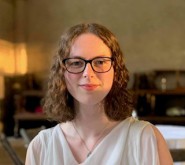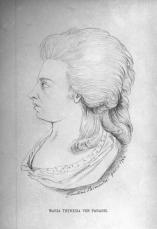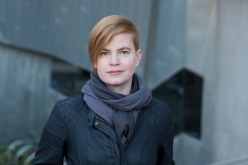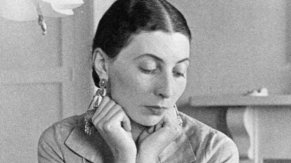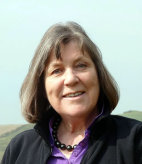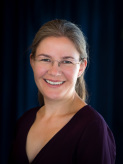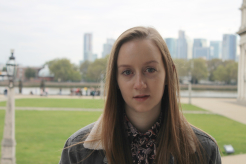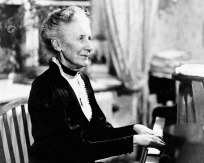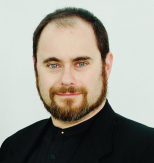Volume 3 - Composers and editors
These brief biographies are taken from Multitude of Voyces Anthology series Sacred Music by Women Composers. Unless otherwise indicated the texts are copyright of Multitude of Voyces C.I.C. and may only be utilised for educational and research purposes such as inclusion within concert programmes when music from our volumes is performed (please include appropriate acknowledgements). Please note some biographies are copyright of third parties and may not be reproduced without the express permission of those named copyright-holders. Photographs are copyright of the photographers where indicated and may not be reproduced in any form without the composers' and photographers' permission. We invite schools and other places of learning to make a small donation to our funds when making use of these resources.
Amy Beach (1867-1944) (neé Cheney)
Amy Cheney was born in Henniker, New Hampshire, US. She displayed exceptional musical ability as a very young child and by the age of eighteen she had already established a career as a concert pianist, appearing as soloist with the Boston Symphony Orchestra in 1885. Upon her marriage, her solo career was curtailed by the prevailing expectations that a married upper-class wife should not continue to engage in public performances, and so Amy Beach turned to Composition - in which she had largely to be self-taught - earning significant praise (albeit gender-referenced) for her Mass in E flat, premièred by the Handel and Haydn Society of Boston, in 1892. Her Festival Jubilate, performed at the World’s Fair in Chicago in 1893, is thought to be the earliest commissioned work by a US woman composer. This endorsement of her abilities was followed by similarly-successful large-scale works including her Gaelic Symphony (1896). Outliving her husband by some thirty-four years, Beach revived her own solo career after 1910, freed to tour Europe and to develop and extend her significant Compositional output.
Lord, now lettest thou thy servant depart in peace (Nunc dimittis), was published in 1891 by A P Schmidt without a Gloria: a Gloria has been composed sympathetically by Sarah MacDonald to enable this work to be included appropriately within the liturgy. Occasional minor rhythmic changes have been made and some underlay adjustments were required in order to accommodate the 1662 Book of Common Prayer translation of the words.
Judith Bingham OBE (b.1952)
Born in Nottingham and brought up in Mansfield and Sheffield, Judith Bingham began composing as a small child, and then studied Composition and singing at the Royal Academy of Music in London. She was for many years in the BBC Singers before becoming their Composer in Residence. Her career has been marked by many outstanding works for the Church. In later years she has become known for her organ music, but she has also written large-scale works for orchestra, a church opera, The Ivory Tree, and a substantial canon of chamber music. Composition prizes include: the Barlow Prize for a cappella music in 2004 and four British Composer Awards in the choral, instrumental and liturgical categories. The University of Aberdeen awarded her an Honorary Doctorate in 2017 and in 2020 she was awarded the OBE for services to music.
Lo! the star forms part of Missa Brevis IV: Videntes Stellam. It was commissioned by the Dean and Chapter of Västerås Cathedral, Sweden, and first performed by Västerås Domkyrkas Motettkör, conducted by Johan Hammarström with Johan Lindström, organ. It is dedicated to The Very Reverend Margarethe Isberg, Dean of Västerås Cathedral, on the occasion of her retirement, January 6th, 2015.
Kerensa Briggs (b. 1991)
Kerensa Briggs is an award-winning composer based in London. Her music has been performed internationally at venues including St Paul’s Cathedral and the Sistine Chapel and has been widely recorded and broadcast by ensembles such as The Tallis Scholars, the BBC Singers and the choirs of Hereford, Worcester and Gloucester Cathedrals. Amongst other accolades Kerensa was winner of the National Centre for Early Music Young Composers Award 2014. She is a member of the TheoArtistry Composers scheme at the University of St Andrews Institute for Theology, Imagination and the Arts; the Illuminate Women’s Music project, and is a board member for the International Alliance for Women in Music. Her love of sacred music emanates from her choral background – she was a member of Gloucester Cathedral Youth Choir, the choir of Trinity College Cambridge, and the choir of King's College London where she held a Choral Scholarship and undertook an MMus in Composition.
A Tender Shoot was commissioned by Cathedral Commissions of Wells Cathedral, for Wells Cathedral Choir and Jeremy Cole. The piece was given its première during the Wells Cathedral Carol Services in December 2020.
Maddalena Casulana (c.1544-c.1590)
Casulana’s place of birth is not certain, but it is known that she spent much of her life in or around the cities of Florence and Venice, where she came into contact with other composers such as Orlando di Lasso, who certainly knew her music, and with publishers such as Giuglio Bonagiunta, who included four of her four-part madrigals within his anthology Il Desiderio (I), in 1566. Just two years later Casulana self-published a complete volume of four-part madrigals, Il primo libro di madrigali, which may have been the first complete volume of music published by a woman in the history of European classical music. That volume was dedicated to Isabella de’ Medici, daughter of the Grand Duke of Tuscany, Cosimo I, with whom she corresponded, though whether the two women were merely acquainted, or friends, is not clear. She appears, highly unusually for her time, to have continued an independent life as a published and self-publishing composer, singer and lutenist, after her marriage. While much of her secular output survives, documentation records that she composed at least two books of madrigali spirituali which are yet to be discovered.
Attesa (Expectation) employs the music of one of Casulana’s secular madrigals, Io d’odorate fronde, self-published in Il secondo libro de’ madrigali a quattro voci (1570). This modern edition is a faithful transcription of Casulana’s original manuscript with very minor adaptations, and the new text has been idiomatically constructed to serve Casulana’s compositional style. (There is no known, authenticated portrait of Maddalena Casulana)
Sarah Cattley (b. 1995)
Sarah read Music at Newnham College, Cambridge. Since graduating in 2016, she has had performances across the UK, as well as in France, Sweden and Ireland, and her music has been broadcast on BBC Radio 3 and Resonance FM. After winning Caritas Chamber Choir’s Composition competition in 2017, she became their Composer of the Year; four of her pieces for the choir appear on their CDs. More recently, she won the 2019 National Centre for Early Music Young Composers Award and the Jesus College Cambridge Composition Competition in 2020. Her recent commissions include Preces and Responses for the 2019 London Festival of Contemporary Church Music broadcast evensong.
Ivy, chief of trees it is was composed for Granta Chorale, and premièred by them in December 2019 in the chapel of Corpus Christi College Cambridge. It was composed in response to the pastoral theme of the concert, ‘A Christmas Garland’.
(Photo copyright Hao Feng)
[Gwendolen] Avril Coleridge Taylor (1903-98)
Avril Coleridge Taylor was born in South Norwood, London, into musical families on both her father's and her mother’s sides: while still in her early teens she won a scholarship to Trinity College of Music where her tutors included Gordon Jacob and Henry Wood. She wrote large-scale and small-scale works for keyboard, voice and orchestra, many of which have pastoral, sorrowful or romantic themes. While she did promote her own compositions and musicianship, enjoying some success as a composer and conductor, a significant focus of her adulthood was to sustain her father’s memory, (the loss of her father at the age of nine had affected her deeply,) and she became an energetic advocate, conducting concerts of his music and, in 1979 writing a biography of his life. Throughout their lives her father’s celebrated work Hiawatha’s Wedding Feast was to link and influence, both personally and musically, the members of her nuclear family. Avril Coleridge Taylor’s mixed heritage - her paternal great-grandfather was a freed slave from America who had settled in Freetown, Sierra Leone, in the mid eighteen hundreds - was to affect her markedly in her middle years when she was asked to leave South Africa (during the apartheid regime) in 1952 while on a musical tour, but in 1957 the contrasting worlds of her heritage came together when she was invited to compose the Ceremonial march to mark Ghana’s independence (from Britain). Avril Coleridge Taylor is recorded as having felt a ‘double-prejudice’ as a Black woman composer.
The Shepherd was composed in 1948 for unspecified voices, under the name of Peter Riley, a pseudonym sometimes used by Avril Coleridge Taylor. Suitable for inclusion at Christmastide, it is also suitable for use within the liturgy on Good Shepherd Sunday.
(Photo credit Getty Images/Hulton Deutsch)
Elizabeth J Croad (b. 1981)
Libby Croad is a composer, arranger and violinist. She studied violin and Composition at the Royal Academy of Music, graduating in 2004. She has written music scores for film and TV production, with albums released for Felt Music, Deep East Music and BMG production. Her choral music is popular with choirs and audiences alike and has been broadcast on BBC Radio 3 and Radio 4. Her Suite for Strings has been performed by some of London’s top chamber orchestras and the first movement, Strati, was broadcast on BBC Radio 3 for International Women’s Day, 2018.
Silent night was premièred by The New London Singers, directed by Ivor Setterfield, in 2016. Since then, it has been performed many times by the Chapel Choir of Girton College, Cambridge and their rendition was broadcast on BBC Radio 4 on 29th December 2019 during Sunday Worship, directed by Gareth Wilson.
Melanie DeMore (b. 1955)
Melanie DeMore is a singer, composer, community musician and social activist. She was born in the Bronx area of New York but has travelled widely, researching and implementing ways in which music (and in particular, song) can be used as a tool for building stronger communities through education and shared experiences. She helps to preserve the African American Folk Tradition through song and Gullah stick pounding, bringing academic discrimination and training, and earthy enthusiasm to her work as a composer and music leader. She works extensively with organisations involved in social justice, including Speak Out!, the Institute for Social and Cultural change, and The Hass Institute for a Fair and Inclusive Society. She is highly esteemed as a singer, having been a founder-member of the Grammy Award-nominated vocal ensemble Linda Tillery and the Cultural Heritage Choir. Her teaching is embedded within a wide community in which she is held in high regard for her ability to use song for healing.
Blessed be! was commissioned by Philip Brunelle in celebration of his wife Carolyn’s fiftieth year as a member of the Plymouth Congregational Choir, Minneapolis.
Emily Hazrati (b. 1998)
Emily Hazrati is a composer studying at the Guildhall School of Music and Drama. She recently completed her MPhil in Composition at Newnham College, Cambridge, having graduated with a BA in Music from Oxford University. Her works have been performed and workshopped by The Choir of Clare College, Cambridge, Tim Gill and David Gompper, Oxford Philharmonic Orchestra, The Choir of Lincoln College, Oxford, The Korrigan Consort, Richard Casey, and Chroma Ensemble, amongst many others. She was commissioned by Choir & Organ Magazine as part of their 2020 New Music series and is writing a new guitar work for Tom McKinney on Psappha’s ‘Composing for…’ scheme. In 2015, she won the Royal Opera House Fanfare Competition; her fanfare was recorded and played as a warning gong at the Royal Opera House for an entire year. Emily is also an active mezzo-soprano, pianist and clarinettist. Most recently, she managed the Minerva Festival’s Composition competition for female and non-binary composers.
Coventry Carol was premièred by Lincoln College Chapel Choir, Oxford, in their Carol Service on 2nd December 2017. The US première was given at Lincoln College’s Alumni Reception on 10th April 2019, at The Cornell Club, New York.
Tamsin Jones (b. 1972)
Tamsin Jones studied music at Newcastle University and then at the University of Birmingham, gaining a PhD there under the supervision of Professor Colin Timms. In recent years she has concentrated increasingly on Composition, earning numerous commissions, prizes and performances on both sides of the Atlantic. Tamsin’s music is noted for its rhythmic vitality, contrapuntal textures and combination of Early Music influences with a contemporary attitude to dissonance.
Verbum caro factum est was originally composed (in a different SATB version) for the Gabrieli Choir, directed by Richárd Sólyom, who premièred the piece at St Margaret's Anglican Episcopal Church, Budapest on 15 December 2017. Since then it has received numerous performances both in the UK and the USA.
Hannah Kendall (b. 1984)
Hannah Kendall studied at the University of Exeter and then at the Royal College of Music where she earned a Distinction for her MA in Advanced Composition. Her music has been performed by such groups as the London Philharmonic Orchestra, the BBC Singers and the Choir of St Paul’s Cathedral (London) and she has earned accolades for its intricacy, imagination and originality. In 2015 she won the Women of the Future Award for Arts and Culture, reflecting her diverse interests, collaborations and dedication to contemporary culture. Kendall works extensively with orchestras and choirs around the world, and in 2017 her work The Spark Catchers, composed for Chineke!, an international organisation ‘championing change and celebrating diversity in classical music’, was premièred at the Royal Albert Hall as part of the BBC Proms. Her commission for the BBC Symphony Orchestra, Tuxedo: Vasco 'de' Gama was given its world première at the First Night of the Proms in 2020. She is currently Doctoral Fellow in Composition at Columbia University, New York.
Nativity was premièred by the BBC Singers on 10th April 2008 at St Bride’s Church, Fleet Street (London, UK).
Isabella Leonarda (c.1620-1704)
Isabella Leonarda was born in Novara, Italy, into a religious family of minor nobility, and entered the Collegio di Sant’Orsola in 1636. Whether she was a cloistered Ursuline nun or a ‘religious virgin’ living out her vocation (or obligation), is unclear. Annotated manuscripts, which Leonarda dedicated variously to local nobles, but also, always, to the Virgin Mary, demonstrate that she held senior religious and organisational roles within the College, as well as that of magistra musicae (music teacher). Her first published works were two sacred dramatic dialogues which appeared within Terzo libro di sacri concenti, an anthology published by Gasparo Casati in 1640. A gap of more than thirty years in the publication of her works is unexplained. From 1676 onwards many of her works were published in quick succession - over 200 survive - including conservatively-composed liturgical and non-liturgical sacred works for boys’ and mens’ voices, and many instrumental works including her Sonate a 1,2,3,4 istromenti opera decima sesta published in Bologna in 1693, as yet the first-known solely instrumental works composed by a woman. (There is no know, authenticated portrait of Isabella Leonarda)
Alma Redemptoris Mater is one of four seasonal liturgical Marian Antiphons sung in honour of the Virgin Mary during Advent, the other three being Ave Regina caelorum, Regina caeli, and Salve Regina. Alma Redemptoris Mater was published by Camagni of Milan in 1684 in the collection Motetti a quattro voci. Barlines, clefs, beaming, slurs, and text have been regularised and modernised throughout. Original key signature: F# present in alto partbook, but absent in all others. Bar 44, B: second note quaver in original Bar 68, B: syllable 'ti' originally on second dotted crotchet Bar 117, B: minims printed as crotchets in original.
(We have been unable to trace a verified portrait of Isabella Leonarda)
Sarah MacDonald (b. 1968)
Sarah MacDonald is a Canadian-born organist, conductor and composer, currently living in the UK, where she is Fellow and Director of Music at Selwyn College, Cambridge, and Director of Ely Cathedral Girls’ Choir. She has been at Selwyn since 1999 and is the first woman to have held such a post in an Oxbridge chapel. She studied at Toronto’s Glenn Gould School and at Cambridge University. Her teachers were Leon Fleisher, Marek Jablonski, John Tuttle and David Sanger. She has performed across the UK, North America, the Middle East and mainland Europe, and is in demand as a conductor and teacher for international residential courses. She has made over 35 commercial recordings and has had numerous choral works published. She holds the Fellowship diploma of the RCO and writes a popular monthly column for the American Guild of Organists’ magazine, The American Organist. In 2018 MacDonald received the honorary ARSCM (Associate of the Royal School of Church Music) in recognition of her contribution to choral music. An advocate for women’s sacred music, MacDonald is series editor for the ‘Sarah MacDonald Choral Series’ with Selah Publishing.
Hymn for the Feasts of St Joseph was specially composed for this volume by Sarah MacDonald and is dedicated to Sean Wilson, with gratitude for his encouragement and support of these anthologies. The anonymous carol Joseph, lieber Joseph mein, which first appeared in the 1544 edition of Johann Walter’s Geistliches Gesangbüchlein, forms an optional Alto descant part in this work.
Elizabeth Maconchy DBE (1907-1994)
Unlike many of the other composers in this anthology, Elizabeth Maconchy did not come from a musical family. But after she showed early musical promise, her supportive, recently-widowed mother moved the family to London so that she could study at the Royal College of Music (RCM). A suggestion by the director of the RCM that Maconchy would stop composing after marriage proved wrong. Instead she enjoyed a startlingly successful beginning to her career with high-profile premieres including The Land, a four-movement suite for large orchestra, performed at the Henry Wood Promenade Concerts (later the BBC Proms) in 1930. Many performances followed, in England, Ireland and on the continent. She became Vice President of the Society for Women Musicians and later, President of the Society for the Promotion of New Music. Despite nearly dying from tuberculosis, Maconchy composed nearly 200 works including thirteen highly regarded string quartets, some 40 orchestral pieces and twelve works for stage.
Nowell, Nowell, Nowell was commissioned by Cambridge University Press for The Cambridge Hymnal, edited by David Holbrook and Elizabeth Poston, first published 1967.
Emma Mundella (1858-96)
Emma Mundella came from a liberally-minded family of textile workers in Nottingham, (UK), and the Unitarian Church provided both her academic and her religious education. In 1876 she moved to London, supported financially through a scholarship from the Corporation of Nottingham, to be amongst the first cohort of The National Training School for Music (which later became the Royal College of Music). She received tuition from several grandees of the late nineteenth century including Sir Arthur Sullivan, Sir John Stainer and Frederick Bridge CVO, and she maintained friendships with them throughout her life, even commissioning them to compose new works for the 2nd edition of her most important oeuvre, the non-denominational Day School Hymn Book (published posthumously in 1896). For all but one year of her teaching career, Mundella worked at Wimbledon High School where she composed primarily, but not exclusively, for the benefit of the pupils and teachers. Remaining unmarried and deeply committed to her work, even to the detriment of her own health, her music was widely published by Novello and others.
The Desert is from the 1892 Novello publication, Twelve New Carols for Christmastide, written by Shapcott Wensley, with each poem set to music by a different composer. An accompaniment and descant have been added to the modest, strophic setting, in this edition by Olivia Sparkhall.
(Photographer unknown)
Helena Paish (b. 2002)
Helena Paish was joint-winner of the BBC Radio 2 Young Choristers of the Year competition in 2014, and joined the first cohort of girl choristers at Truro Cathedral in 2015, under the directorship of Christopher Gray. In 2019 she was a winner in the Upper Junior category of the annual BBC Young Composer Competition. Her winning piece, Twilight, was performed by the BBC Singers, conducted by Sofi Jeannin in August 2019 as part of the BBC Proms season. Following this success she was commissioned by the BBC to compose Life, part of Seven Ages of Woman, an innovative seven-movement composition to mark International Women’s Day 2020, in which each composer represented a different decade of life. The complete work was recorded by the BBC Singers, directed by Grace Rossiter, and broadcast on March 8th 2020. Helena is currently studying Music at Trinity College, Cambridge, where she also holds a Choral Scholarship.
While Mary Slept was composed specially for this volume, to enrich the repertoire of post-Epiphany works with texts by women poets. The piece will be given its première at Truro Cathedral’s Festival of Nine Lessons and Carols on Christmas Eve 2020.
Maria Theresia von Paradis (1759-1824)
Maria Theresia von Paradis was born into a family closely connected with the Austrian court: this association brought her into contact with high-ranking musicians throughout her life, including Wolfgang Amadeus Mozart, and Antonio Salieri, from whom she received Composition lessons. A virtuoso pianist and organist, and skilled singer, her musical potential might have been hampered by her loss of sight in early childhood, were it not for the determination of her mother and the financial support of Empress Maria Theresia (after whom von Paradis was named). A composer from early adulthood, she wrote operas, cantatas, songs and works for piano, using a compositional aid devised by her librettist, Johann Riedinger to enable her to notate her works more easily. In later life she dedicated herself to her own private music school where she taught singing and piano, with the express intention of improving educational opportunities for girls and women. (We are seeking an authenticated portrait of M T von Paradis to include on this website).
Es ist ein’ Ros’, a well-known Marian text, is employed in this setting in place of the original words Der Auferstehungs-Morgen, (the Resurrection Morning), which was one of twelve songs published as Zwölf Lieder auf ihrer Reise in Musik gesetzt by Breitkopf, in 1786. The Soprano melody and piano accompaniment in this arrangement are original to von Paradis; a sympathetic second soprano line has been added in this edition by Olivia Sparkhall.
Katharine Parton (b. 1982)
Katharine Parton is an Australian conductor and composer who champions opportunities for young women conductors. She is currently completing a PhD on conductor gesture and orchestral interaction at the University of Melbourne, having spent three years as Director of Music and Bye-Fellow at Fitzwilliam College, University of Cambridge. She has received national and international awards recognising the innovative nature of her work on cognition, music and gesture. Her own composition centres on the juxtaposition of the natural world and technology. Her works have been workshopped and performed in England, Scotland and Australia by groups including Voces8 and the Fitzwilliam College Chapel Choir.
Gaudebat et Ridebat! was composed for Fitzwilliam College Chapel Choir and was premièred in November 2015.
Yshani Perinpanayagam (b. 1983)
Yshani Perinpanayagam is a concert pianist, Musical Director, composer and teacher. Her extensive training included studies at the Royal College of Music and at Guildhall School of Music and Drama; she now teaches at both of these establishments. As a concert pianist she has performed with the City of Birmingham Symphony Orchestra, Britten Sinfonia, and the BBC Concert Orchestra and has performed at venues including Queen Elizabeth Hall, Wigmore Hall and Barbican Theatre. Her diverse work as Musical Director includes several Olivier Award-nominated and Award-winning productions and extends to improvisatory work with notable comedy performers. Recently Perinpanayagam has developed her composition portfolio and has been commissioned by the Musicians’ Union among others.
In Bethlehem above was written during a period of intense work by the composer, in response to the privations of the Covid-19 pandemic in 2020.
Sheena Phillips (b. 1958)
Sheena Phillips grew up in London and studied Mathematics at Cambridge University. She has directed and composed or arranged music for a wide range of community, church, school, student and professional choirs in Scotland, London and the US. She is particularly drawn to the natural world, poetry and folk music as sources of inspiration. Sheena is an active member of CoMA (Contemporary Music for All) and Editor of Canasg Music, an online choral sheet music publisher. She has studied with Emily Doolittle for several years and her choral music has been published widely and broadcast on the BBC.
The Christmas Bird was written for - and was a joint winner of - the 2012 Welcome Christmas competition run by the Minneapolis choir VocalEssence (Directed by Philip Brunelle) and the American Composers Forum. It was premièred in December 2012 by VocalEssence with Michele Antonello Frisch (flute).
Elizabeth Poston (1905-87)
Elizabeth Poston, well known for her unique carol, Jesus Christ the Apple Tree, was a prolific composer, particularly of songs, producing a dozen or so meticulously researched song-books, as well as orchestral and chamber music, choral works and two operettas (altogether at least 920 works).
Born in rural Hertfordshire, she was inspired by the sounds of the countryside, saying that songs were ‘always her first and permanent love’. Her adored home, Rooks Nest House, standing on the northern outskirts of Stevenage, in view of the Chilterns, was equally appreciated by E. M. Forster, who had spent much of his youth there. He subsequently based his novel, Howards End on the house and its Poston inhabitants. Elizabeth had the moving experience of writing the incidental music for its 1970 BBC film production, as she also did for that of his Room with a View and some 65 other BBC commissions.
She had a long association with the BBC: even as a student her Compositions were broadcast; in her early 30s during World War II, she was appointed Director of Music for the European Service, transmitting coded messages in the form of precisely-timed recorded music; after the war she helped to set up the BBC Third Programme, served on the BBC Advisory Panel and broadcast as a pianist and gave talks, including two notable series on her close friend, the composer Peter Warlock, who loved fifteenth and sixteenth century texts as she did – ‘the music of the words’. (Dr John S. Alabaster author: Elizabeth Poston: Catalogue of Works with Biographical Context (Alabaster, J. S., 2018))
The Lamb was first published in Elizabeth Poston’s The Children’s Song Book (Bodley Head, 1961). That publication features several original settings of religious texts, intended by Elizabeth Poston to be learned and performed domestically, but equally suitable for liturgical use.
Rhian Samuel (b. 1944)
Rhian Samuel is a Welsh composer of over 140 published works for ensembles from full orchestra to solo instruments. The former include Tirluniau/Landscapes, premiered at the BBC Millenium Proms (2000), and Clytemnestra (for soprano and orchestra), recently issued on disc (BIS) and short-listed for a 2020 Gramophone Award. She has written for professional choirs including New College, Oxford, (Ave Maria and Ave Regina Coelorum), and the BBC Singers, (The Shape of Trees), as well as mixed college choirs, including her own at Reading University (Lovesongs and Observations) and City University, London, and those of Ithaca College, New York, and Washington University, St Louis, US. Samuel is the co-editor of the Norton/Grove Dictionary of Women Composers. In 2006 she was awarded the Glyndŵr Medal for services to the Arts in Wales.
Rhyfedd, rhyfedd/Wonder, wonder
Rhyfedd, rhyfedd is a renowned text by Welsh non-conformist hymn-writer, Ann Griffiths. It paints in brilliant colours the angels’ differing visions of the Lord of Glory and the humble birth of the Christ-child, a contrast which is conveyed here in a work composed specially for this volume. The English translation follows closely the meaning and imagery of Griffiths’ poem, and reproduces the strong rhythms of the original Welsh verse.
Olivia Sparkhall (b. 1976)
Olivia Sparkhall is a composer, conductor and music teacher, and Head of Academic Music at Godolphin School, Salisbury (UK). She received Composition lessons from Derek Bourgeois at school, before attending Durham and Cambridge Universities. She co-founded Multitude of Voyces with Louise Stewart, for that organisation’s inaugural International Women’s Day service held in Salisbury in March 2017, and through this association has been privileged to enable more music by women to be published and performed. Her own works have been performed worldwide, with pieces featured on BBC Songs of Praise. In 2018 she was delighted to be shortlisted in the Cappella Nova composing competition. She has recently completed a Masters in Voice Pedagogy, and had papers published in UK and US music journals.
Gabriel’s Message is suitable for inclusion during Advent and also on the Feast of the Annunciation and on other Marian Feast Days.
Amy Summers (b. 1996)
Amy Summers is a composer based in London. She studied music at the University of Nottingham where she was awarded the Hallward Prize for Composition and graduated with first class honours in 2017. Having been a choral scholar at Nottingham (Roman Catholic) Cathedral, she took up the position there of Composer-in-Residence before continuing her studies as a postgraduate at Trinity Laban Conservatoire of Music and Dance. Since graduating she has had commissions from Brunel Sinfonia, the Ludlow English Song Festival and Exultate Singers. Her music has been broadcast on BBC Radio 3 and published by several publishing houses.
Nunc dimittis was composed for Nottingham Cathedral Choir, directed by Alex Patterson, and premièred in February 2018.
Alice Tegnér (1864-1943)
Alice Charlotta Tegnér was born in Karlshamn in southern Sweden, and received her early musical education from her father. At the age of thirteen she moved to Stockholm to continue her musical studies, and there she received Composition and piano lessons from Hermann Berens, a teacher at the Royal Swedish Academy of Music. She flourished both musically and socially in her new surroundings, but financial hardship and the conservative nature of her marriage later restricted her own musical development, and she turned her attention instead to teaching, which would become her lifelong passion. An interest in the social and educational benefits of music to children formed the focus of much of her Compositional output – she was a prolific writer of children’s songs – and she lived out a life of social activism and charitable generosity, contributing greatly to the musical and educational life in Djursholm, a suburb of Stockholm, later becoming influential nationally through the publication of her children’s songbook Nu ska vi sjunga. In 1924 she was elected to The Royal Swedish Academy of Music and her work remains a significant part of Swedish musical life.
Bethlehem’s Star originally published in 1893 as a solo song with piano accompaniment, has been specially arranged by Sarah MacDonald for this volume, as part of our work to promote and raise awareness of important historical musical educators. Betlehems Stjarna has become one of Alice Tegnér’s best-known works and is closely associated with the celebrations of St Lucia on 13th December. This arrangement is dedicated to Louise and Andrew Stewart, with gratitude and admiration, and in turn they offer their warm thanks to Sarah MacDonald for her unstinting support of this Anthology series.
Alison Willis (b. 1971)
Alison Willis is an award-winning composer whose works have been performed and broadcast internationally. She studied Composition with Alan Bullard and George Benjamin and is completing a PhD with Paul Mealor and Phillip Cooke at the University of Aberdeen. Her music has been described as “Stunning”, "Intensely moving", "Beautiful yet pragmatic" and "Saying what you have to say and then stopping". She finds particular inspiration in historical sources and events and social issues and enjoys working collaboratively with both young people and adults. Willis is also an experienced pianist, organist, folk musician and Musical Director, enjoys composing music for theatre and is a Trustee of the Martin Read Foundation, supporting young composers. Alison is delighted to be included in this third Anthology and very grateful to Louise Stewart and the Multitude of Voyces team for all their hard work and dedication.
There is no Rose (an allegory for the Virgin Mary), is the second movement of Rosarium, a setting of five medieval carols for unaccompanied SATB (divisi) and also for SSAA (divisi). The carols can be sung individually or as a collection.
Henry Lebedinsky, editor, Leonarda Isabella: Alma Redeptoris Mater
American historical keyboardist, composer and conductor Henry Lebedinsky has performed with the Seattle Baroque Orchestra, Seattle Symphony, Seattle Opera, the St . Paul Chamber Orchestra, the Charlotte Symphony, Seraphic Fire, and Sonoma Bach, among others. He is the co-Artistic Director of Seattle's Pacific MusicWorks, and is the founder of PMW's Underground concert series, dedicated to bringing old music to new audiences in unconventional, fun, and exciting venues. With the San Francisco-based band Agave Baroque, he has released two albums with countertenor Reginald L. Mobley on the VGo Recordings label. He and Mr Mobley have spent the past decade introducing audiences to music by Black composers from the past 250 years. An active composer and poet, his sacred music is published by Paraclete Press, Carus-Verlag Stuttgart, and CanticaNOVA. He currently serves as Organist and Choirmaster at Seattle’s historic Christ Episcopal Church.

